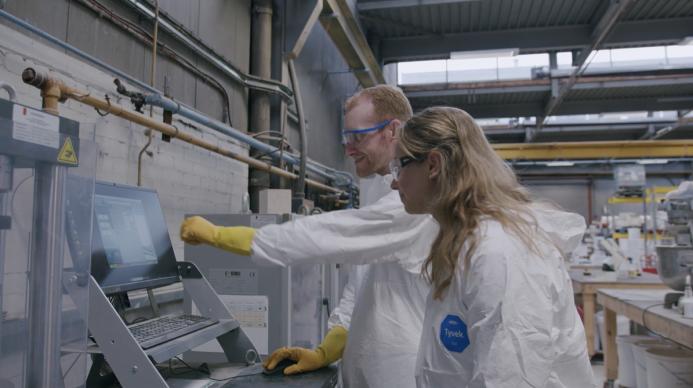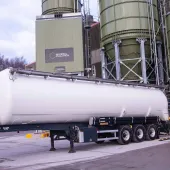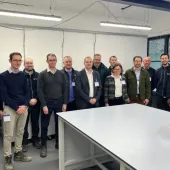Ultra-low carbon cement facility for Teesside
A new ultra-low carbon cement production facility in Teesside is set to significantly advance the UK construction sector's efforts to achieve net zero emissions.
Material Evolution, the company behind the £7.6 million Mevocrete project, has collaborated with academic and industry partners to develop this innovative cement technology, with funding from Innovate UK under the Transforming Foundation Industries (TFI) Challenge programme.
Based in Middlesbrough, Material Evolution is preparing to start production of its ultra-low carbon cement at its first manufacturing site in Wrexham next month (October). This will establish the company as the UK’s largest producer of low-carbon cement.
Through the Mevocrete project, Material Evolution is also working on a carbon-negative cement, which it plans to produce at the Wrexham site. Currently, their cement product offers up to 85% less embodied CO2 compared to traditional Ordinary Portland Cement (OPC), while still maintaining quality and workability. The company aims to produce 150,000 tonnes of this low-carbon cement annually.
Material Evolution also intends to expand its production across the UK and Europe, generating interest among concrete specifiers and producers due to the potential for substantial carbon reductions.
Professor David Hughes, Chief Scientific Officer at Material Evolution and co-lead of the Mevocrete project, highlighted the importance of this work for the construction industry's transition to a more sustainable future.
“This project represents a collaborative effort towards a carbon-neutral built environment. By using Mevocrete and new technology, we can divert industrial by-products away from landfill, contributing to the decarbonisation of one of the most widely used materials in the world.”
Cement, as a key binder in concrete, is a major contributor to CO2 emissions. Material Evolution's goal is to create a net-zero embodied carbon cement, which is not only more durable but also transformative for the UK's infrastructure and housing on a large scale. The company is already in discussions with leading contractors, architects, and government agencies to influence how cement is produced and specified.
The recent revision to the industry standard for concrete, BS 8500, by the British Standards Institution (BSI) in October 2023, has provided greater flexibility for producers. This allows for the use of up to 65% less OPC replacement by low-carbon materials, supporting the concrete industry's decarbonisation efforts. Additionally, the new BSI Code of Practice Flex 350 enables the specification of a broader range of lower carbon concretes.
Material Evolution, founded in 2017 by Dr Liz Gilligan and Sam Clark, is also conducting Mevocrete trials with Spanish steel recycling company Celsa to further advance its development. Dr Gilligan expressed the company’s mission to decarbonise the construction industry by offering products that significantly reduce carbon emissions.
Dr Gilligan said: “Our goal is to remove one gigaton of carbon by 2040. We’ve made significant progress in a short time, and soon we’ll launch our first large-scale cement factory in Wrexham. This will provide contractors, engineers, and architects with the materials needed to build a greener future.”
The Mevocrete project is scheduled to conclude at the end of 2024, positioning Material Evolution as a leader in the £500 billion concrete industry.
Material Evolution is focused on reducing carbon emissions and making a positive environmental impact. The company targets the cement and concrete industries, aiming to save one gigaton of CO2 by 2040. Based in Middlesbrough, the company is led by co-founders Dr Liz Gilligan and Sam Clark, supported by a diverse team of innovators, scientists, and experts. Material Evolution is currently producing cement with 85% fewer CO2 emissions than traditional OPC, with plans to scale up to zero-carbon cement production.
The Mevocrete project, located at the Materials Processing Institute in Middlesbrough, builds on Material Evolution's alkali-fusion technology to develop the world's first truly carbon-negative cement. The project involves partners from across the concrete supply chain to develop and scale a geopolymer cement made from industrial wastes. Material Evolution has also developed a digital waste mapping tool and AI-driven algorithms to identify and manage these industrial wastes.
Project partners include, Materials Processing Institute (MPI), Teesside University, LKAB, NanoMox, Enursan, Celsa Steel UK (Celsa), and ZTL.







